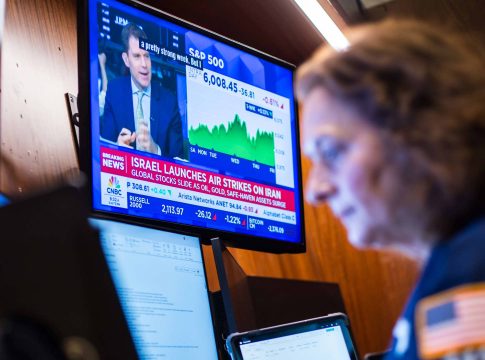Financial Markets Face Volatility Amid Global Unrest and Economic Updates
Last week began with a sense of calm, but a sudden shift occurred when Israel targeted Iranian nuclear facilities, sending ripples through global financial markets. Let’s dive into the three key themes that shaped the market landscape.
1. Geopolitical Tensions
The geopolitical climate took a sharp turn on Friday after the Israeli strike on Iran. This event caused U.S. stock markets to decline, with the S&P 500 and Nasdaq Composite dropping 1.13% and 1.3%, respectively. In contrast, energy prices surged, with Brent crude and West Texas Intermediate crude futures increasing by approximately 7% to 7.5%.
As investors sought safe-haven assets amidst the volatility, gold prices climbed to a two-month peak. What was initially shaping up to be a positive week for the stock market ended with losses, as both the S&P 500 and Nasdaq recorded declines of 0.4% and 0.6% over the week, halting their back-to-back winning streaks. While the U.S. dollar struggled through the week, it did show a slight rebound, and trade relations between the U.S. and China also took a positive note with an announcement on a trade-deal framework focused on rare-earth minerals.
2. Positive Economic Indicators
On a brighter note, recent economic data revealed encouraging signs regarding inflation. The Consumer Price Index (CPI), a key measure of inflation, showed growth that was lower than anticipated, suggesting that inflationary pressures might be easing. Similarly, the Producer Price Index (PPI) also reported lower-than-expected wholesale inflation figures.
Despite signs of a softening labor market, jobless claims remained stable, indicating that unemployment remains low. These indicators provide a sense of relief for consumers by improving their purchasing power and adding stability to the market.
3. Generative AI Innovations
In the tech sector, artificial intelligence (AI) continued to be a focal point for market movements. Apple kicked off the week with its annual developer conference but left many investors wanting more in terms of AI advancements. Conversely, Meta Platforms generated excitement by announcing a significant investment in Scale AI and the establishment of a new "superintelligence" unit.
Nvidia also held an event where CEO Jensen Huang highlighted the growing demand for computing capacity, pointing to future expansions in Europe. Meanwhile, Oracle reported better-than-expected earnings, causing its stock to soar and prompting a buy rating upgrade from BMO Capital, suggesting a promising outlook for AI-related services. Lastly, Advanced Micro Devices (AMD) unveiled plans for a new AI server chip set for release in 2026 and announced a partnership with OpenAI, further highlighting the growing competition in the AI space.
What This Means for You
The increase in geopolitical tensions can affect your investment portfolios, so it might be wise to evaluate your asset allocation, especially if you have exposure to stocks and commodities. Keeping an eye on economic indicators can guide you on when to make purchasing decisions or adjustments in your spending habits.
And if you’re interested in tech investments, particularly in AI, consider looking into companies that are innovating in that space, like Meta, Oracle, and AMD. Staying informed will better equip you to navigate these fluctuations in the market.
In a world of volatility, knowledge and preparation can help you make more informed financial decisions.

Writes about personal finance, side hustles, gadgets, and tech innovation.
Bio: Priya specializes in making complex financial and tech topics easy to digest, with experience in fintech and consumer reviews.

